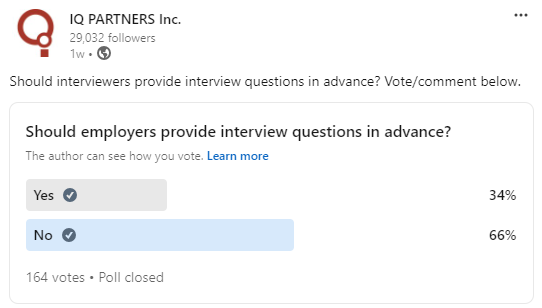There is a lot of pressure on candidates to provide the perfect answer to job interview questions. There’s no question that interviews are stressful. Some wonder if this pressure affects people’s abilities to answer interview questions to the best of their ability. Our Toronto headhunters have come across many candidates who are great for the job, but they struggle with interviews. To remedy this, some have wondered if you should share interview questions in advance.

Our most recent LinkedIn poll sought to find out what people think about this topic.
Should Interviewers Provide Interview Questions In Advance?
Our recent poll data has found that respondents firmly believe that employers should NOT provide interview questions in advance – by a 2 to 1 ratio. 66% responded no, and 34% said yes.

Even though our poll has a clear result, there is still a case to be made for both sides. Below, we’ll outline some of the reasons why you would and wouldn’t want to give out questions in advance.
Why should interviewers provide candidates with interview questions in advance?
There is a case to be made for giving candidates questions in advance. Most jobs afford you the time and resources to prepare for interactions. So, offering the questions can allow you to see how well someone can prepare for a meeting. Here’s the case for giving interviewees questions in advance:
- Better Preparation: Candidates have time to prepare thoughtful, well-structured responses, leading to a more meaningful and productive interview.
- Reduced Stress: Knowing the types of questions in advance can reduce interview anxiety, helping candidates showcase their true abilities.
- Fairness and Transparency: This approach ensures that all candidates are evaluated on the same criteria, promoting fairness in the selection process.
- Efficient Use of Time: With prepared candidates, interviews can focus on deeper discussions, problem-solving, and cultural fit rather than basic information.
- More Accurate Assessments: Well-prepared candidates are more likely to present their skills and experiences accurately, allowing interviewers to make more informed hiring decisions.
Why shouldn’t interviewers give candidates interview questions in advance?
Most employers don’t give candidates questions in advance. They don’t want people to provide rehearsed answers. Here’s the case for not providing questions before the interview:
- Testing Spontaneity: Interviewers often want to see how candidates think on their feet, handle unexpected questions, and solve problems under pressure. Providing questions in advance could diminish this aspect.
- Assessing Authenticity: Some employers prefer to gauge natural, unrehearsed responses. If candidates have too much time to prepare, they may give polished answers that don’t fully reflect their true skills, personality, or thought process.
- Measuring Problem-Solving Skills: In many roles, quick thinking and problem-solving are critical. Not giving questions beforehand allows interviewers to evaluate a candidate’s ability to analyze and respond to new situations in real time.
- Preventing Over-Preparedness: Over-preparation might lead candidates to memorize answers, which can come across as robotic or insincere. Interviewers want to see genuine, spontaneous engagement rather than rehearsed responses.
- Testing Flexibility: Not providing questions in advance allows interviewers to see how candidates adapt to the interview flow and follow-up questions, which often arise during deeper discussions.
Interviewers may withhold questions to better assess the candidate’s quick thinking, adaptability, and authenticity during the interview. A possible compromise is to offer an overview of the interview and provide topics or themes that will be discussed instead of the questions.
More Hiring Insights By Our Toronto Headhunters
How Much Does Employee Turnover ACTUALLY Cost?
7 Ways to Minimize the Impact of Unconscious Bias in Your Job Interview Process





